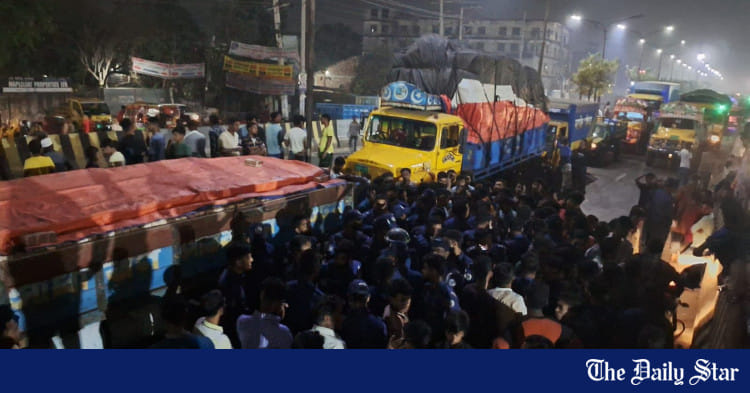- Copy to clipboard
- Thread starter
- #256
Saif
Senior Member
- Messages
- 14,237
- Reaction score
- 7,473
- Origin

- Residence

- Axis Group


Textile unit closures may surge amid rising gas prices: BTMA
Bangladesh Textile Mills Association president Showkat Aziz Russell on Tuesday said that textile sector in Bangladesh might experience a surge in factory closures as a result of further hike in gas prices...
 www.newagebd.net
www.newagebd.net
Textile unit closures may surge amid rising gas prices: BTMA
Staff Correspondent 18 February, 2025, 22:33

Bangladesh Textile Mills Association president Showkat Aziz Russell speaks at a press conference in the capital Dhaka on Tuesday. | Press release
Bangladesh Textile Mills Association president Showkat Aziz Russell on Tuesday said that textile sector in Bangladesh might experience a surge in factory closures as a result of further hike in gas prices.
He said that despite hiking the gas price by nearly 179 per cent in 2023, the government still could not ensure uninterrupted gas supply to the industries.
‘In this scenario, if the government doubles the gas prices, Bangladesh’s textile sector will never become sustainable and the sector will lose its competitiveness,’ he added.
He said that it would also be a hindrance in getting fresh investments and bank finance.
The BTMA president was speaking at a press conference on the upcoming Dhaka International Textile and Garment Machinery Exhibition (DTG) in the capital Dhaka on the day.
Responding to a question, he said that it was high time to attract investment to Bangladesh, as Chinese factories were phasing out from the textile business.
‘China is shifting towards high-end industries, leading to closure of some apparel, textile and footwear companies. Moreover, a number of businesses are relocating from China due to rising labour costs,’ he added.
He said that US president Donald Trump had imposed an additional 10 per cent import duty on Chinese goods, resulting in some businesses moving their operations elsewhere.
‘To attract this investment, the government must ensure stable utility prices and an uninterrupted supply of fuel and gas. If we can secure some of these investments, it will help create employments in our country,’ he added.
He also expressed concerns over frequent policy changes. He urged the government to include industry representatives in Bangladesh Petroleum Corporation and Titas Gas boards to oversee gas procurement and distribution processes.
Regarding the national election, he said that the announcement of the national polls was necessary so that they could plan their investments.
Russell also pointed out that the textile industry had lost competitiveness over the years due to rising business costs, particularly as utility prices continued to increase.
Regarding the yarn import from India, he said that if there had been an uninterrupted supply of gas, they would not have imported much yarn from the neighbouring country.
‘Bangladesh imported yarn worth $2.7 billion in recent times as our factories are sitting idle due to gas shortage. For this reason, a number of workers have become jobless and now they are doing various miscreant activities,’ he added.
He also said that the past government did not explore gas, but completed contracts to buy gas from spot markets, which led to dollar crises. The problems are still persistent as most of the contracts were long-term, he said.
The BTMA, in collaboration with Yorkers Trade & Marketing Service Co, Limited, Hong Kong, will organise the 19th edition of DTG from February 20 to 23 at the International Convention City Bashundhara in the capital Dhaka.
Staff Correspondent 18 February, 2025, 22:33
Bangladesh Textile Mills Association president Showkat Aziz Russell speaks at a press conference in the capital Dhaka on Tuesday. | Press release
Bangladesh Textile Mills Association president Showkat Aziz Russell on Tuesday said that textile sector in Bangladesh might experience a surge in factory closures as a result of further hike in gas prices.
He said that despite hiking the gas price by nearly 179 per cent in 2023, the government still could not ensure uninterrupted gas supply to the industries.
‘In this scenario, if the government doubles the gas prices, Bangladesh’s textile sector will never become sustainable and the sector will lose its competitiveness,’ he added.
He said that it would also be a hindrance in getting fresh investments and bank finance.
The BTMA president was speaking at a press conference on the upcoming Dhaka International Textile and Garment Machinery Exhibition (DTG) in the capital Dhaka on the day.
Responding to a question, he said that it was high time to attract investment to Bangladesh, as Chinese factories were phasing out from the textile business.
‘China is shifting towards high-end industries, leading to closure of some apparel, textile and footwear companies. Moreover, a number of businesses are relocating from China due to rising labour costs,’ he added.
He said that US president Donald Trump had imposed an additional 10 per cent import duty on Chinese goods, resulting in some businesses moving their operations elsewhere.
‘To attract this investment, the government must ensure stable utility prices and an uninterrupted supply of fuel and gas. If we can secure some of these investments, it will help create employments in our country,’ he added.
He also expressed concerns over frequent policy changes. He urged the government to include industry representatives in Bangladesh Petroleum Corporation and Titas Gas boards to oversee gas procurement and distribution processes.
Regarding the national election, he said that the announcement of the national polls was necessary so that they could plan their investments.
Russell also pointed out that the textile industry had lost competitiveness over the years due to rising business costs, particularly as utility prices continued to increase.
Regarding the yarn import from India, he said that if there had been an uninterrupted supply of gas, they would not have imported much yarn from the neighbouring country.
‘Bangladesh imported yarn worth $2.7 billion in recent times as our factories are sitting idle due to gas shortage. For this reason, a number of workers have become jobless and now they are doing various miscreant activities,’ he added.
He also said that the past government did not explore gas, but completed contracts to buy gas from spot markets, which led to dollar crises. The problems are still persistent as most of the contracts were long-term, he said.
The BTMA, in collaboration with Yorkers Trade & Marketing Service Co, Limited, Hong Kong, will organise the 19th edition of DTG from February 20 to 23 at the International Convention City Bashundhara in the capital Dhaka.












